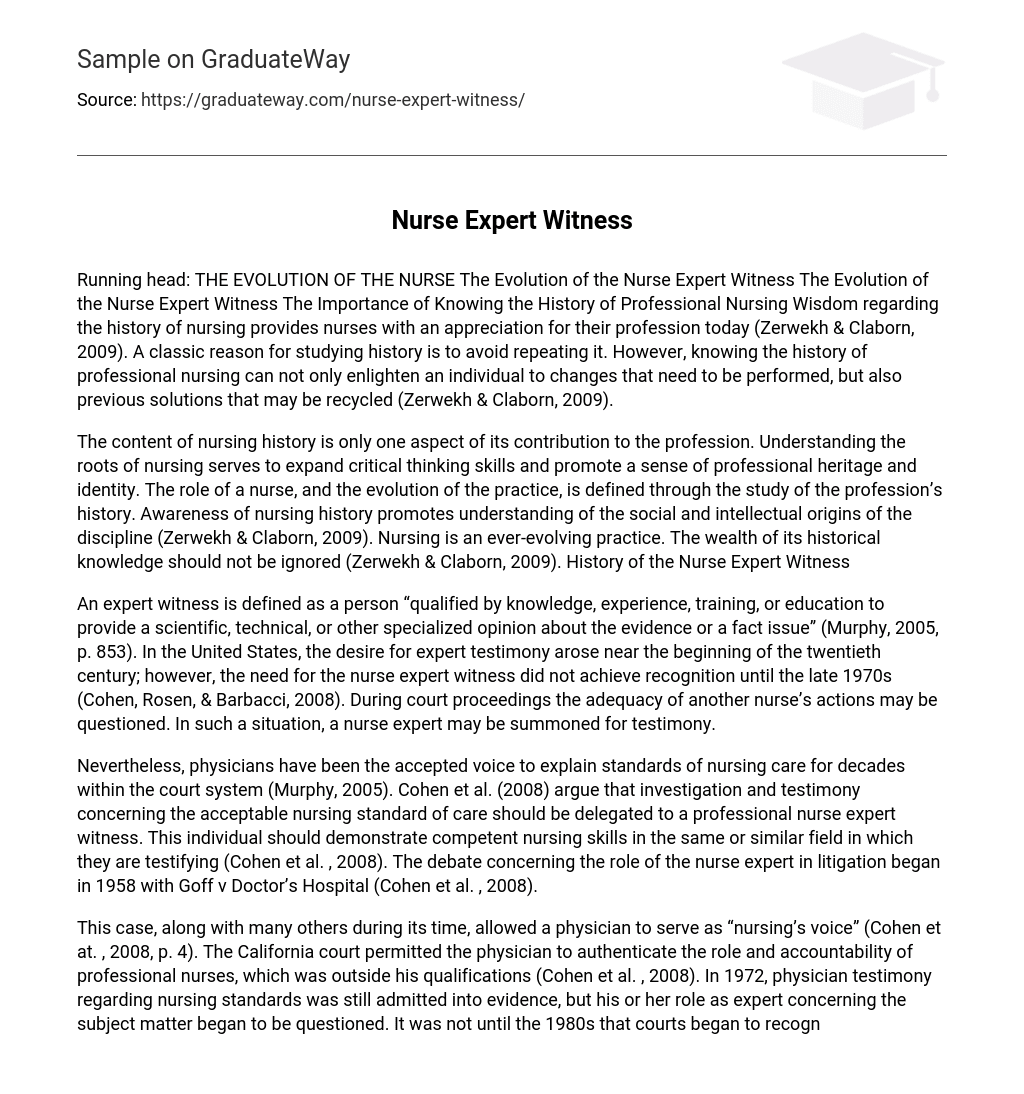Introduction
Understanding the history of nursing gives nurses a valuable perspective on their current profession (Zerwekh & Claborn, 2009). One benefit of studying history is to prevent repeating past mistakes. Additionally, knowledge of the history of professional nursing can shed light on both necessary changes and past solutions that can be revisited (Zerwekh & Claborn, 2009).
The contribution of nursing history to the profession extends beyond its content. By understanding the origins of nursing, critical thinking skills are broadened and a sense of professional heritage and identity is fostered. The study of nursing history defines the role of a nurse and the evolution of the practice. Awareness of nursing history promotes comprehension of the social and intellectual roots of the discipline (Zerwekh & Claborn, 2009). Nursing is a continuously evolving field, and the wealth of knowledge from its history should not be overlooked (Zerwekh & Claborn, 2009).
History of the Nurse Expert Witness
Expert witnesses in the United States are individuals with expertise and qualifications to offer opinions on scientific, technical, or specialized evidence. The requirement for expert testimony was established in the early 20th century, but recognition of nurse expert witnesses didn’t occur until the late 1970s. In legal proceedings involving a nurse’s actions, a nurse expert may be called upon to provide testimony.
According to Murphy (2005), doctors have traditionally been the main source of information regarding nursing care standards in court. However, Cohen et al. (2008) believe that professional nurse experts, who have shown expertise in the specific area they are testifying about, should be responsible for investigating and providing testimony on acceptable nursing standards. The discussion surrounding the involvement of nurse experts in legal cases originated from Goff v Doctor’s Hospital in 1958 (Cohen et al., 2008).
In this time frame, a specific case and similar ones gave a doctor the power to speak on behalf of and support nursing. Cohen et al. (2008) state that this ruling by the California court permitted the doctor to confirm the duties and commitments of professional nurses, even though they didn’t have the required qualifications in the field.
Historically, courts had doubts about physicians’ authority in determining nursing standards. However, their testimony was still considered evidence until 1972. It wasn’t until later that nurses were acknowledged as the most appropriate professionals to set the standard of care for nursing (Cohen et al. 2008).
Despite progress in the 1980s (Cohen et al., 2008), the battle for a permanent position for nurse expert witnesses in court continues. In Flanagan v Labe (1997), a registered nurse’s testimony was deemed “inadmissible” (Cohen et al., 2008, p. 5). However, The American Association of Nurse Attorneys submitted a brief in 2003 that was cited by the Illinois Supreme Court, concluding that a nurse was the most qualified individual to provide opinion evidence regarding the nursing standard of care (Cohen et al., 2008).
According to Cohen et al. (2008), the nursing profession has assumed more responsibilities over time, but this does not lead to a proportional increase in the acknowledgment of nurses’ autonomy.
Health Care Practices During the 1970s and 1980s
During the 1970s and 1980s, in addition to the nurse expert witness, other healthcare practices emerged due to rising health insurance costs caused by extensive advancements in medical technology and a perceived inefficiency in the healthcare system.
During this period, there was growth in health maintenance organizations (HMOs) and other managed-care systems. A significant change occurred as many of these systems shifted from being non-profit to for-profit entities. This shift allowed them to gain more control in the decision-making process of approving or rejecting patient treatment (Noah, 2007). Additionally, there was a notable trend towards increased autonomy within the nursing profession during the 1970s and 1980s. Nurses started entering the field with advanced degrees, replacing post-high school training as the new standard (Cohen et al., 2008).
During this time, the introduction of hospice care was a direct response to the nursing shortage in America. In 1971, hospice nursing began in the United States, taking inspiration from Cicely Saunders of Saint Christopher’s Hospice in London. Florence Wald collaborated with colleagues in New Haven, Connecticut to establish a patient and family-centered hospice (Adams, 2008, p. 1). Despite experiencing growth and encountering new opportunities for nursing profession, challenges still remained.
In the 1980s, nurses became the largest group of healthcare professionals in the United States. However, there were ongoing shortages and a high turnover rate within the profession, which led to the current nursing deficit in the country (Noah, 2007).
Most Interesting Aspect and Its Impact on Contemporary Nursing
The nurse expert witness’s responsibility and character have evolved greatly over the course of the profession’s history (Cohen et al., 2008). In the past, they were solely seen as fact witnesses and their involvement with the patient’s care was not recognized.
According to Cohen et al. (2008), the nurse expert witness has taken on expanded responsibilities in areas like life care planning and forensic nursing. To establish credibility and prove their value in the legal field, individuals in these roles must undergo specialized training and education. The demand for programs that prepare nurses for non-traditional roles, including nurse expert witnesses, is increasing (Cohen et al., 2008).
References
- Adams, C. (2008). Florence Wald (1917-2008): Pioneer in hospice care. Retrieved February 25, 2009 from http://www. ursingadvocacy. org/press/pioneers/florence_wald. html
- Cohen, M. , Rosen, L. , and Barbacci, M. (2008). Past, present, and future: The evolution of the nurse expert witness [Electronic version]. Journal of Legal Nurse Consulting, 19(4), 3-8.
- Murphy, E. (2005). The expert nurse witness [Electronic version]. AORN Journal, 82(5), 853-856.
- Noah, T. (2009). A short history of health care: Jonathan Cohn shows how we got here. Retrieved February 25, 2009 from http://www. slate. com/id/2161736/
- Zerwekh, J. and Claborn, J. (2009). Nursing today: Transition and trends (6th ed. ). St. Louis, MO: Saunders Elsevier.





